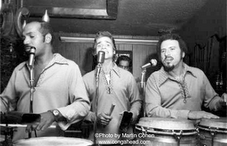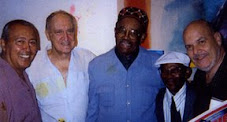Before there was an Ernesto Antonio “Tito” Puente, there was Julio Andino. While Tito even has the 1979 Sugar Hill hip-hop to his many credits, Julio has no mention as a musician who brought the entire Latino music world before the public, the global public. While Tito introduced the xylophone’s power, and Cugat popularized rumba, Ignacio Piniero the son, and Arsenio the Afro-Cuban element, Julio brought into play a whole body of mainly repressed Latin music that was ignored while he himself was ignored.
Many give credit to Azpiazu’s “El Manisero,” but Julio did more than make people dance. He made them stop and listen and think and in doing so they heard the soul of the music calling to them. It was a sad, tough world of “no job, no heat, no hot water”—the years of the Great Depression that Julio navigated. It was one that Tito never knew the way Julio did. Tito is here forever while it is as though Julio never was, even though Tito, with admirable compassion in a heartless industry, was gratefully acknowledging Julio’s influence, an influence initiated by Julio that brought out the pride in Puerto Rican communities everywhere.
For forty years, Joe Conzo Jr. spoke for Tito as his manager while Julio was surrounded by those who would silence him. He never heard the screaming adherents that followed Tito, for himself; but he does have what Hindus consider sainthood. Like a mahatma, Julio was that one man alone who sent out the message of this music of the streets to the four corners of the world by prying open the door that closeted El Barrio musicians. He pioneered for them both the white and black dominated turfs of the late 1930s. He made possible the one trustworthy source of joy in a beset world—one that sings a child to sleep and one whose thunder and lightning can blow you away.
Tito’s popularity, for one, is Julio’s legacy.


No comments:
Post a Comment